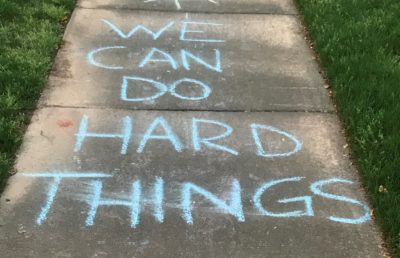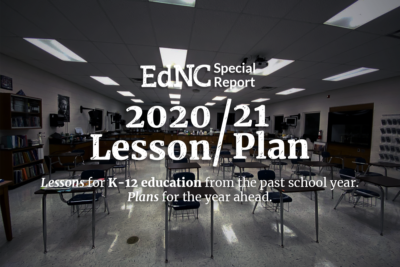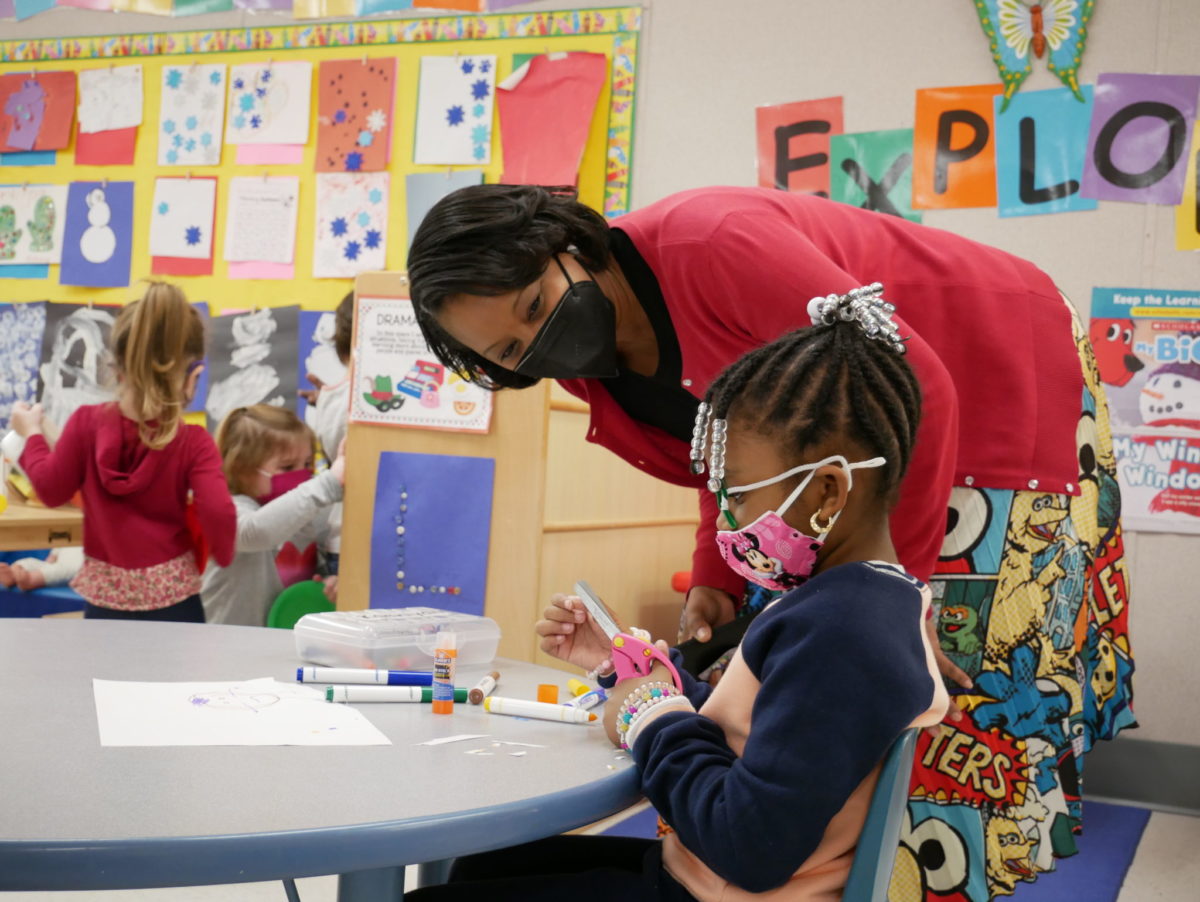
Last Thursday was the crossover deadline at the General Assembly, which means — to put it simply — that legislation must have passed at least one chamber of the General Assembly or have a financial component in order for lawmakers to consider it moving forward.
Now, there are always exceptions to this rule. Sometimes lawmakers will, for instance, take a bill that survived crossover, delete its contents, and put in place a brand new bill that keeps only the same bill number. That’s generally frowned upon, but it happens.
But barring unforeseen circumstances, we now have the list of bills that can be considered. Let’s look back at what’s happened so far this session and what might still happen going forward.
Sign up for the EdDaily to start each weekday with the top education news.
Coming back to school
The first big push out of the General Assembly this session was legislation to get students back in school.
Gov. Roy Cooper closed school buildings in March 2020 due to COVID-19, and things haven’t been the same since. In the fall, he allowed them to reopen under either plan B or plan C. Plan B is a hybrid model that is part remote learning and part in-person instruction. Plan C is all remote learning. Later in the fall, Cooper allowed elementary schools to open under plan A. In plan A, all students are back in the classroom and social distancing is minimal.
Republican Senators put out legislation in early February that would would make schools open for exceptional needs students under plan A, and under either plan A or plan B for all other students. Families who wanted their students to remain fully virtual would still have that option.
A version of that bill ultimately passed the General Assembly in mid-February, but Cooper vetoed the bill in late February. He didn’t like that the legislation was at odds with recommendations on in-person learning from the state’s Department of Health and Human Services.
But legislators and Cooper eventually reached an agreement, and a bill passed quickly, bringing all students back under either plan A or B.
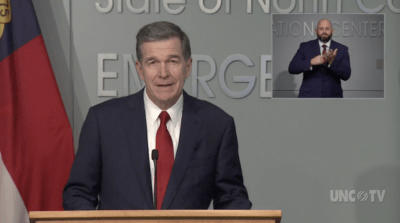
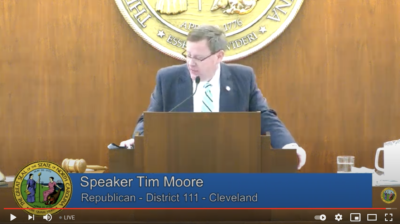
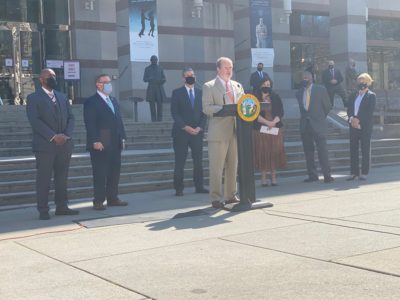
Summer learning
Another early piece of legislation this session was a bill that would require summer learning programs in every district across the state to address the learning loss associated with COVID-19.
House Speaker Tim Moore, R-Cleveland, introduced the legislation at a press conference on Feb. 16. Initially, the bill would have required each school district to offer a six-week summer program to K-12 students with a priority on students who are considered at risk. The legislation said students who are not at risk could participate if space is available.
The bill passed the full General Assembly by April 1 with only one major change: Rather than being a six-week program, the bill changed so that the summer program had to last at least 150 hours or 30 days.
On Friday, April 9, Cooper sent out an email announcing he had signed the bill into law.
Read to Achieve
Another piece of big news this session was the passage of a bill that amends Read to Achieve, requiring the training of pre-K and elementary school teachers in the science of reading and directing the State Board of Education to develop new literacy instruction standards.
Read to Achieve is a program created and championed by Senate President Pro Tem Phil Berger, R-Rockingham, back in 2012. It attempts to ensure students don’t leave third grade without being able to read by using additional supports, including reading camps, to get students where they need to be.
Back in 2019, the State Board heard a report stating that only 52% of first graders in North Carolina were demonstrating reading comprehension. That figure was 56% for second grade students, and the pass rate on third-grade end-of-year reading tests was only 55.9%. And those rates had been declining over time. At the same meeting, the Board heard a report from the Friday Institute for Educational Innovation which found that attempts to reverse this trend using Read to Achieve had failed.
This bill was a continued attempt to address some of the issues that may have contributed to this failure, including the fact that implementation strategies vary widely from district to district.
“Learning to read early in life is critical for our children and this legislation will help educators improve the way they teach reading,” Cooper said in the statement. “But ultimate success will hinge on attracting and keeping the best teachers with significantly better pay and more help in the classroom with tutoring and instructional coaching.”
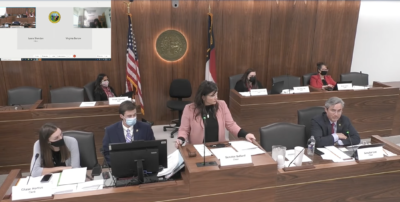
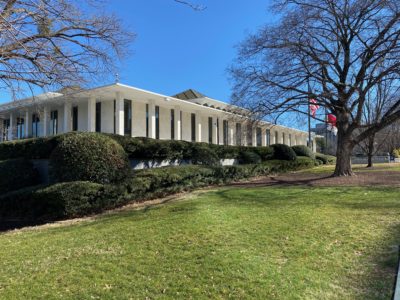
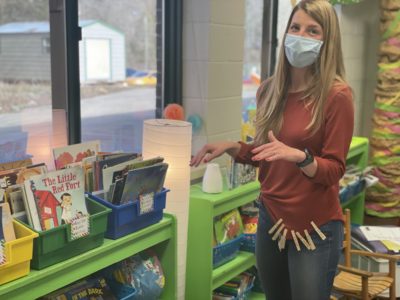
COVID-19
The General Assembly also passed a bill allocating federal COVID-19 relief to a variety of things, including public education. Cooper signed the bill into law on March 11.
The bill included:
- $1 million “to collect, analyze, and report data related to the overall impacts of COVID-19 on public school units, students …”
- $10 million “to ensure that each public school unit receives a total amount from the Elementary and Secondary School Emergency Relief II (ESSER II) Fund of at least one hundred eighty dollars ($180.00) per pupil in federal grant funds …”
- $10 million “for contracted services for school health support personnel to provide additional physical and mental health support services for students in response to COVID-19 …”
- $10 million for school nutrition.
- $1 million to assess “cybersecurity capabilities of public schools.”
- $9 million to implement a statewide cybersecurity program for public schools.
- $12 million “to contract with Voyager Sopris Learning, Inc., to provide Language Essentials for Teachers of Reading and Spelling training for teachers for improving the literacy and language development of students …”
- $15 million “for the Extended Learning and Integrated Student Supports Competitive Grant Program.”
- $40 million for a summer learning program for at-risk students.
- A little more than $26 million “to be held in reserve by the Department to be allocated to public school units to support COVID-19 related needs, including in-person instruction programs to address learning loss and provide enrichment activities in the summer.”
- A little more than $8 million for the Department of Public Instruction to use for administrative costs.
The bill was notable, in part, because lawmakers allocated money that had previously been the purview of the State Board of Education to spend. Read more about that in the article below.
Those bills have all passed the General Assembly already, but what bills are still open to consideration?
For starters, the biggest bill of all — the budget bill — has yet to emerge. So stay tuned for that. In the meantime, here is a comprehensive — though perhaps not exhaustive — list of significant education bills that have passed one chamber.
What education bills are left?
Opportunity scholarships
Both the House and the Senate passed separate bills that would expand the state’s opportunity scholarship program. If I were a betting man, I would bet that neither of these bills will pass the full legislature on their own, but that some amalgam of the two will end up in the final budget that passes the General Assembly.
The opportunity scholarship program, often referred to as a voucher program by opponents, provides up to $4,200 to low-income students to attend the private school of their choice.
The Senate bill would increase the amount of money offered by such scholarships and would increase the income eligibility amount from about 150% of the income required to qualify for free- and reduced-price lunch to 175%.
Under the bill, the scholarship amount would increase to up to 90% of state per pupil funding. The current average state per pupil allocation is $6,586, according to staff at the state Department of Public Instruction. That means students using opportunity scholarships could receive a little over $5,900 per year.
The House bill also increases the amount of money students could get. Under that bill, eligible students could receive “up to seventy percent (70%) of the average State per pupil allocation in the prior fiscal year.” That figure would increase to 80% in the 2023-24 school year.
This means if the House bill becomes law, opportunity scholarship recipients could get $4,610 until 2023-24, when they could get about $5,269.
Both the House and Senate bills would also merge two other school choice programs: the Special Education Scholarship for Children with Disabilities and the Personal Education Savings Account.
Academic transparency
A bill titled “An act to ensure academic transparency,” would require schools and districts to make information available to the public on what instructional materials and activities are being used in classrooms.
By the end of the school year, teachers would have to post an outline of what was taught during the year as well as information the public could access to follow up on the material. Teachers would also be required to publicly post “the lesson plans that were used at the school during the prior school year.” According to the bill, “Lesson plans shall identify, at a minimum, (i) all instructional materials by the title and the author, organization, or website associated with each material and activity, (ii) a brief descriptor of the instructional material, and (iii) a link to the instructional material, if publicly available on the internet, or information on how to request review of a copy of the instructional material in person.”
Districts would also have to post how materials and instruction are reviewed by the district on their website.
The bill comes amid increased scrutiny in schools around topics like teachings on racial equity. Lt. Gov. Mark Robinson created a webpage so people could report attempts of “indoctrination” of students and established a task force to look into such allegations. He and other Republicans on the State Board of Education also objected earlier this year to new social studies standards. Much of the debate focused on the use of words such as “racism,” “discrimination,” and “identity.”
The bill is controversial, and the North Carolina Association of Educators (NCAE) came out against it.
The link in the tweet above takes you to a post on The Action Network sponsored by the NCAE. It says:
“This completely unnecessary and unimaginably burdensome law would require teachers and school districts to post online a comprehensive list of all teaching, classroom and assignment materials used by every teacher in every class session.
“Every single book, article, video clip, song, webpage, or even any assignment or assessment would have to be documented, organized, collected and posted to the web. Every. Single. One. And to what end? So right-wing conservatives can cherry-pick examples of ‘liberal indoctrination’? So that legislators who have not taught a day in their lives can bully and undermine our professionalism? Not on our watch.”
Rep. Hugh Blackwell, R-Burke, a primary sponsor of the bill, said in committee that when parents are active in their children’s education, students have better outcomes, and this legislation would help parents have more information to enable them to be more engaged.
“This is one of those efforts to say, ‘We’re going to make a little extra effort … to try to make this as simple as possible while still providing the transparency so that parents can be aware of what is being offered to their students,’” Blackwell said.
Calendar flexibility
A slew of calendar flexibility were filed and some were passed the House, which means they remain open for consideration by the Senate. But don’t hold your breath.
The House has always been more friendly to such legislation, which usually dies in the Senate. And Berger has said numerous times this session that such legislation is not likely to go anywhere.
Districts say they need calendar flexibility to deal with a host of problems, including issues arising from inclement weather, being forced to hold semester-ending exams after winter break, and the need to align local public school calendars with those of community colleges.
There is large-scale bipartisan support for calendar flexibility, but advocates say that the tourism industry holds up legislation because businesses that rely on student workers over the summer don’t want districts to cut into their season.
Student conduct
On May 6, a bill that changes standards of student conduct in North Carolina schools passed the House on a party line vote — Democrats voted against and Republicans voted for. The most significant change the bill makes is removing from current law the following examples as things that should not be considered serious actions on the part of students.
- Inappropriate or disrespectful language.
- Noncompliance with a staff directive.
- Dress code violations.
- Minor physical altercations that do not involve weapons or injury.
This is an important distinction because long-term suspensions and expulsions in public schools are supposed to be limited to “serious violations” of student conduct codes.
The examples now being removed were first added to state law back in 2011 out of a recognition that not having students in school can contribute to “behavioral problems, diminish academic achievement, and hasten school dropout.”
Odds and ends
Here are some other significant bills that are still alive thanks to passing one or another chamber:
- A House bill that Republicans say is aimed at critical race theory and would prevent discrimination in schools. Democrats say the bill would prevent educators from teaching the true history of race in America to students. Read more about that in the articles below.

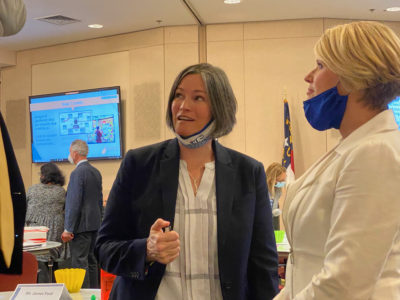
- A House bill that would let teachers take personal leave without having to pay the cost of their substitute teacher. Currently, if a teacher takes personal leave on a day when they have to be in the classroom, they are responsible for covering the cost of the substitute teacher who will take their place. Under this legislation, however, if the teacher provides a reason for taking personal leave, they won’t be responsible for covering the cost of a substitute.
- A Senate bill that takes up a number of waivers the State Board of Education is seeking from lawmakers to relax accountability requirements related to standardized testing. The federal government has already offered waivers in these areas, but the State Board needed state lawmakers to sign off as well. Read more about that here.
- A Senate bill that makes it easier for child care facilities to keep their star ratings. Senate Bill 570 delays state assessments and loosens requirements on teacher education levels until 2023, aiming to help providers with teacher vacancies.
- A House bill that would increase child care subsidy rates for child care providers. The legislation raises the rates from the latest market rate survey (June 2018). It would also create a subsidy “floor” for child care providers. The legislation would allocate $13.5 million in recurring funds for 2021-22 and $18 million in recurring funds for 2022-23 to increase market rates for the subsidies. This bill hasn’t passed a chamber yet, but since it deals with appropriations, it can still be considered.
- A House bill that would replace the annual end-of-course tests in grades 9-12 with a “nationally recognized assessment of high school achievement and college readiness.” Ultimately, it would mean students could go from taking four tests during high school to just one. The bill would also eliminate the requirement that career and technical education students take the ACT WorkKeys assessment. That would be replaced with a new career readiness indicator.
- A Senate bill that would remove the legal requirement that families appeal due process hearings to the State Board of Education. It would instead allow them to appeal directly to state or federal courts. You can read EdNC reporter Rupen Fofaria’s story on the bill here.
- A Senate bill that would let those with a bachelor’s or graduate degree be an adjunct high school teacher if they had attended a community college and finished at least one semester’s worth of courses in teacher preparation.
- A House bill that would increase the dropout age from 16 to 18.
Here is a link to all bills — not just those related to education — that made the crossover deadline.
Recommended reading
